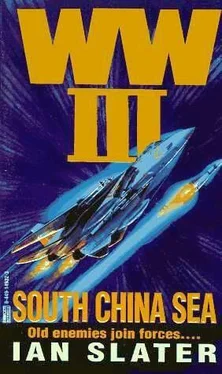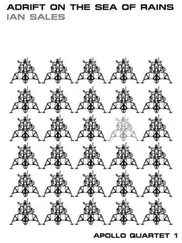Baker walked down an alley lit by Chinese lanterns, heading for Hung Vuong Boulevard. He passed the electronics market, with radios blaring, turned onto Ngo Gia Tu Boulevard, and passed the Nha Sau Church. Although he was over a quarter mile from the Kinh Tau Hu Canal to the south, he could smell its garbage mixed with gasoline and dust, and the odor of more baking in the hot, sticky air. Still, he would rather meet whoever had made the phone call here than at 28 Vo Van Tan — in the War Crimes Museum — where the last Vietnamese who supposedly had a “hot tip” had insisted on meeting him. Baker had been compelled, then, to see the black and white photographs of atrocities by American “imperialists,” specifically the American photo of the My Lai massacre and Lieutenant Calley, and some fuzzy shots of “China’s imperialist aggression” against some of the “Vietnamese islands” in the Paracels and the Spratlys.
“Chao.”
It was a softly spoken hello, filled more with apprehension than warmth.
“Chao,” Baker replied.
“Toi,” the Chinese urged, leading the way. He was a man in his late thirties, Baker guessed, no more than five feet two at the outside, and looking furtively around as they passed one of the sidewalk stalls, its wooden plank shelves bent with glass jars full of pickled cobras, the old woman in the stall busy cooking rice. The Chinese man told Baker that it wasn’t far.
“What isn’t far?” Baker asked, not bothering to hide the irritation in his voice. “Where are we going?”
“Not far,” the other man said, and Baker realized that he was probably just a go-between and would cost him another 100,000 dong.
“If this turns out to be nothing,” he told the man as he walked more quickly, now passing stalls smelling of fried rice and spices, “you get nothing. Understand? Zero. Zilch.”
“Co, phai,” the man assured him. “Co, phai… yes, yes. I understand.”
“Good,” Baker said.
They made a sharp right turn onto Nguyen Tri Phuong Boulevard, heading toward the canal. Down by the waterway, the Chinese pointed to a sampan with an old man aboard, among dozens of others, then held out his hand.
“Not so fast,” Baker told him in English. “Let’s hear what grandpa has to say.”
“I go now,” the man said urgently, his hand outthrust.
“Well, off you go, buddy,” Baker told him. “But you don’t get one dong until I hear from Uncle Ho here.”
The elderly chin-bearded Chinese on the sampan gave no indication that he knew what was going on. He merely stared out from the boat at the black water.
Baker touched his cap as a sign of respect for the elder and said, “Chao.”
The old man nodded, the white taper of his beard barely visible for a second as he turned to watch a police boat chugging by, its searchlight darting here and there, momentarily illuminating the scores of sampans and other houseboats.
“Parlez-vous français?” the old man asked.
“No,” Baker replied, getting more irritated by the second. Why in the hell was he wasting his time by the fetid canal when he could be enjoying a good drip coffee and croissant back at his office?
The old man raised his head in the direction of a younger Chinese nearby — perhaps his son — indicating that he should go away. The young one didn’t like it and said something sharp to the old man, who in turn barked a quick rejoinder and waved him off. The young man walked sullenly along by the canal, and in the habit of the Chinese, paused for a long spit, standing there, letting it dribble down his chin before he moved on, casting a faint shadow on the lanterns’ silken reflections as they undulated over the wake of the passing police boat.
“I know a secret,” the old man said.
Baker said nothing.
“A bad thing has been done,” the old man continued, in no hurry to explain himself.
Baker took out a Gitane and lit it, its pungent odor floating about the sampan, shrouding the old man momentarily in a dark fog. How many times had he waited like this for information, Baker asked himself, for the merest suggestion of some of the 2,434 MIAs who were either buried by now or had been kept as prisoners until they were of no more use to the “Black Pajamas,” as the Viet Cong had been known to the Americans? How many times had he waited for one decent lead?
“The gangsters in Beijing are in charge,” the old man said. “Li Peng’s gang.”
“They’ve always been in charge,” Baker said impatiently. He remembered the words of the historian Bo Yang: “With each new dynasty and each new reign throughout Chinese history, the throne has never changed, only the ass that is on it.”
“But not so much when Chairman Deng was alive.”
“Deng,” Baker answered, “was as bad as the rest of them. Who called in the tanks at Tiananmen Square?”
“But Deng understood how far to go.”
“Did he? I wouldn’t know. You should ask the students who were run over.”
“Still,” the old man said, “there must be order.”
Baker had had enough. “Do you know anything about Americans still being held — POWs, MIAs?”
“Yes.”
“What do you know?”
“That Li Peng’s gang have done a bad thing.”
“You mean some MIAs have been taken across the border into China?”
“Possibly, but I mean this giving money to the pirates.”
“Look,” Baker said exasperatedly, “do you have something to tell me about our MIAs or not?” With that, the American straightened up, ready to leave, adding, “There have always been pirates. They made a fortune smuggling cigarettes, liquor — plundering the boat people. That’s not news.”
“But this,” the old man said insistently, making the point with his left forefinger bent, crooked down like a fishing hook, the shape of Vietnam, “this is to make Vietnam look like the aggressor.”
“What are you talking about? What aggression?”
“Against the disputed islands.”
Baker didn’t know too much about any disputed islands. China and Vietnam were always arguing about some offshore reef or such, especially now with the promise of big oil and gas deposits beneath the South China Sea and with oil accounting for more than a third of all Vietnam’s exports. But though Baker’s concern was MIAs, he now sensed there was something bigger at hand. It wasn’t the old man’s chin wagging about Li Peng’s gang, but rather his tone. It was the voice of a man who was too burdened, who had heard something in the sampans or the stalls and had to share it. At first Baker wondered why the old man, a Chinese, would be bad-mouthing China, but if there was something China was doing — or about to do — that might bring down the wrath of the Vietnamese on the Chinese Vietnam community, like the pogrom of 1978-79 here in Ho Chi Minh City from which so many Chinese fled, some taking to the open sea, he could appreciate the old man’s concern.
“How will Beijing make Vietnam look like the aggressor?” Baker asked.
“The pirates are to use the Vietnamese flag.”
“For what?”
“For attacking disputed islands. The flag is to be upside down.”
“Distress signal?”
“Yes. It is to get in close.” The old man looked at Baker with a face the color of ancient parchment. “How long have you been here?”
“In Vietnam? Five, going on six—” Then Baker fully understood. It was like looking through a microscope, suddenly seeing a blurred slide jump into focus. “You mean the Chinese pay pirates to use the Vietnamese flag so everyone’ll think it’s Vietnamese attacking?” But why was the old man telling him this? “Because,” Baker continued, answering his own question, “it would cause trouble between China and Vietnam again, and when there’s that kind of trouble, the Vietnamese take it out on you.” He meant not only the Chinese in Cholon, but all over Vietnam.
Читать дальше












